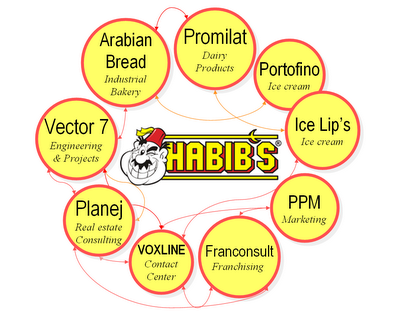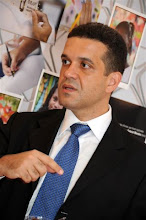Archive for June 2006
BNDES Innovation Fund
The Technology Fund launched last week (21 June) will sponsor projects that relate to economic and social development in specific subject areas, including agricultural biotechnology, drugs for neglected diseases, software and semiconductors.
Research into generating energy from biomass — such as developing fuel based on alcohol derived from fermented sugar cane — will also be eligible.
The bank has already invested US$128 million in such projects. The existing projects will be competing with new ones for the technology fund's grants.
The fund is intended to support projects that find technological solutions to problems already identified by Brazilian research institutes and economists.
It also aims to promote innovation by backing ideas that look set to introduce new products onto international markets, something that Brazil has not excelled at to date.
"Technology and innovation are critical factors for the country's development", says Aluísio Asti, one of bank's economists who helped set up the fund. Asti said the Technology Fund would operate in line with the bank's innovation policy that was introduced in 2005.
GOL Airlines
 GOL Linhas Aereas Inteligentes SA (Public, NYSE:GOL) is a low-fare, low-cost airline based in São Paulo, Brazil.
GOL Linhas Aereas Inteligentes SA (Public, NYSE:GOL) is a low-fare, low-cost airline based in São Paulo, Brazil. The airline was established in 2000 and started operations on 15 January 2001. It is a subsidiary of Brazilian conglomerate Grupo Aurea, which has other transport interests including Brazil's largest long-distance bus company. Grupo Aurea in turn is owned by the Constantino family. Gol's unprecedented low fares revolutionized the domestic Brazilian air travel market. As of 2004, Gol had carried 11,600,000 passengers, and constituted 20% of the Brazilian air travel market. On 24 June 2004 Gol launched simultaneous initial public offerings on the New York and Sao Paulo stock exchanges. It is now owned by AeroPar Participacoes (77%), Venture (17.6%) and American International Group (5.4%) and employs 3,303 staff. The growth in Gol`s stock price made the Constantino family a member of the Forbes` billionaire list in 2005.

As the first discount airline in South America, Gol has modeled itself after the American discount flight giant Southwest and has rapidly made large profits.
Gol chief executive officer Constantino de Oliveira Junior, said: "We've made flying popular, we've extended the Gol effect to Brazil and South America by expanding our business, with innovation, efficiency, quality service and disciplined control of costs and rates."
"What made the difference was that Gol arrived on the scene with a new fleet. As a result, its maintenance costs were extremely low. In addition, it was operating on routes that were short and had a high density of traffic. It was selling tickets almost exclusively on the Internet, the way it is still doing today.” According to Oliveira, that approach means that Gol enjoys considerably lower sales costs per ticket.
Gol has managed to change some paradigms of the Brazilian aviation sector, which traditionally valued such concepts as sophistication, elegance and glamour when marketing air travel. The big concepts were broken by the simplicity, practicality and simplification of Gol’s operations.
Currently Gol has 41 flights between Brazil and neighboring Argentina. Most of its major destinations can be reached on direct flights from Miami, Dallas and Los Angeles.
* GOL Linhas Aereas Inteligentes SA Brazil's leading discount airline. The Company provides frequent service on routes between all of Brazil's major cities and to international destinations in Argentina, Bolivia, Paraguay and Uruguay. As of December 31, 2005, it operated 42 single-class Boeing 737 aircraft, and offered 420 daily flights in Brazil and to its international destinations.
Habib's Food Franchise
 THE BIGGEST BRAZILIAN FAST FOOD CHAIN, HABIB'S* opened its first shop in 1988, in Sao Bernardo do Campo, Sao Paulo state. Since that has innovated in various ways delivering new products and services that combine efficiency, originality but above all a clearly respect and knowledge about its market, the low and middle income population.
THE BIGGEST BRAZILIAN FAST FOOD CHAIN, HABIB'S* opened its first shop in 1988, in Sao Bernardo do Campo, Sao Paulo state. Since that has innovated in various ways delivering new products and services that combine efficiency, originality but above all a clearly respect and knowledge about its market, the low and middle income population.Low prices, variety and high performance in quality are the foundations which have brought Habib´s two prizes by ABF - Brazilian Franchising Association and an Alshop - Brazilian Association of Shopping Vendors prize (the brazilian retailer "oscar").
The Habib's relationship politics with its customers and the adjustment to the Brazilian pockets, brought in these 16 years a recognized success together the average consumer. The company presents respectable numbers as 120 million meals served/year, beyond a patrimony of 12 a thousand employee right-handers, responsible for all the operacionaliztion of the brand an essential part of the Habib's success.
The growth index translates the investments carried through in the 9 central offices of manipulation and distribution of menu itens, delivered through more than 260 shops in the main regions of the country.
 Habib´s has also innovated on the structural and intelectual capital of the company in building 9 interdependent enterprises that work toghether on the operationalization of the brand: an Industrial Bakery (Arabian Bread), 2 Ice cream factories (Ice Lip's and Portofino), Dairy products (Promilat), Contact Center (VOXLINE), Marketing (PPM), Engineering and Projects (Vector 7), Franchising (Franconsult) and Real estate Consulting (Planej).
Habib´s has also innovated on the structural and intelectual capital of the company in building 9 interdependent enterprises that work toghether on the operationalization of the brand: an Industrial Bakery (Arabian Bread), 2 Ice cream factories (Ice Lip's and Portofino), Dairy products (Promilat), Contact Center (VOXLINE), Marketing (PPM), Engineering and Projects (Vector 7), Franchising (Franconsult) and Real estate Consulting (Planej). The most popular products at Habib's are the esfiha - a small, round flatbread topped with minced beef or cheese - and the kibe - a croquette of beef shaped like a rugby ball.
The most popular products at Habib's are the esfiha - a small, round flatbread topped with minced beef or cheese - and the kibe - a croquette of beef shaped like a rugby ball.These are deliberately priced as low as possible. Esfihas sell for 69 Brazilian centavos (31 cents) each, with the price falling to 39 centavos in some special offers.
Although people of Arab descent make up a mere 7% of the Brazilian population, delicacies as hummus, stuffed vine leaves and tabouleh as part of its menu are being delivered at this time in less than "28 minutes" at home in every city that has a Habib's store.
Habib's
Sao Paulo, Brazil
Telephone: + 55 0800 775 6000
Site: www.habibs.com
* Habib's is a Brazilian fast food chain. Specialising in Arabic cuisine, it has more than 260 outlets across the country and has recently begun expansion into foreign markets. Habib's is the second largest fast food chain in Brazil, second only to McDonald's.
Ariaú Amazon Towers
 Ecotourism is an activity that provides financial and qualitative revenues. It is a business alternative, a lucrative activity capable of substituting for agriculture and exploitation of wood; the revenue will come with lodging, feeding, services and entrance to natural attractions.
Ecotourism is an activity that provides financial and qualitative revenues. It is a business alternative, a lucrative activity capable of substituting for agriculture and exploitation of wood; the revenue will come with lodging, feeding, services and entrance to natural attractions. Ariaú Amazon Towers was inaugurated in 1987 and was the first hotel in the jungle. It is located along the river Ariaú, approximately 60km northwest of Manaus. From Manaus it takes about 2 hours to go by regional boats, by speedboat, 1 hour, and by helicopter 15min. It is entirely built on stilts at tree top level in the heart of the Amazon Rain Forest. The water of the river next to the hotel has high acidity and therefore is no mosquitoes in the surrounding area. Many famous people has visited the hotel through the years, like; former Chancellor of Germany Mr. Helmut Kohl, the Queen and King of Sweden, Mr. Bill Gates, former president of the USA Mr. Jimmy Carter, etc. Since the hotel was inaugurated it has grown a lot, today there are more than 300 guest rooms, beauty- and hair salon, and three places to land helicopters, - it has become as a small town in the jungle.

The hotel provides with several kinds of accommodations, standard & superior rooms, Royal- Presidential- & Imperial suites, and Tarzan's house. There are 310 individual apartments and suites, all with private baths, balconies, hammock, TV mini-bar, and a fan. You may add for room with air-conditioning, etc. There are as well telephone & Internet facilities, two swimming pools built at canopy level and restaurant and cafeteria facilities to serve up to 300 guests. Nearby is the Anavilhanas Archipelago, formed by 380 islands, which provides endless options for sightseeing. One auditorium with total infrastructure for 500 people. The Tarzan's house is located on the top of a nut tree (Castanheiro, one of the largest trees in the Amazon forest, 16m high). The Tarzan suite gives its guests a sensation of an adventure. It is complete with A/C, balcony, mini-bar, and private bath.
The Hotel uses local labor, generates employment and fastens the man to his community. Each direct employment generated by tourism represents another person with revenue to spend in their own community and indirect employment linked to services and other support for products such as lodging, food service, fuel, handicraft, equipment, film and courses.
The local community around the leisure complex acquired conscience that tourism increases the level of employment and quality of life, and started to preserve nature. The increase of local economic activity is the best form to preserve natural places such as the Amazon Forest in a short time.
Ariaú Amazon Towers
Manaus, Brazil
Telephone: + 55 (92) 234-7308
Site: www.ariautowers.com
Sustainable Banking Innovations
 Brazil's financial sector does it again: it's home to two of the four emerging market banks singled out for innovations in sustainable banking in the Financial Times 2006 Sustainable Banking Awards shortlist, released earlier this week. Brazil's Banco ABN Amro Real1 and Banco Itau2 were shortlisted for the "Emerging Markets Sustainable Bank of the Year" laurels, along with South Africa's Nedbank and India's Yes Bank.
Brazil's financial sector does it again: it's home to two of the four emerging market banks singled out for innovations in sustainable banking in the Financial Times 2006 Sustainable Banking Awards shortlist, released earlier this week. Brazil's Banco ABN Amro Real1 and Banco Itau2 were shortlisted for the "Emerging Markets Sustainable Bank of the Year" laurels, along with South Africa's Nedbank and India's Yes Bank. The FT Sustainable Banking Awards program, held jointly with World Bank's IFC - International Finance Corporation, recognizes global banks that have actively integrated social and environmental objectives into their operations.

Brazil is fast establishing itself as a hub of innovations on sustainable financing in emerging markets. In December 2005, it launched the Bovespa Sustainability Index, the first of its kind in Latin America. The index includes local companies listed on the Sao Paulo Stock Exchange and will track not only their economic and financial performance, but also their corporate governance and environmental and social performance.
[1] Banco Real was founded in Belo Horizonte, Minas Gerais state, on 16 June, 1925 as Banco da Lavoura de Minas Gerais. In mid-1998, the strategic partnership between Banco Real and Banco ABN AMRO SA - the Brazilian subsidiary of ABN AMRO Bank - was announced. ABN AMRO Bank (ABN AMRO), which owns all of the shares of ABN AMRO Bank N.V., is an international banking group offering a range of banking products and financial services on a global basis through its network of 3,557 offices and branches in 58 countries and territories.
[2] Banco Itau Holding Financeira S.A. (Public, NYSE:ITU) is the 2nd major private bank in Brazil founded in Sao Paulo, on 1945. The Company has four principal operations: banking (including retail banking through its wholly owned subsidiary, Banco Itau S.A. (Itau), corporate banking through its wholly owned subsidiary, Banco Itau BBA S.A. (Itau BBA) and consumer credit to non-account hold customers through Itaucred), credit cards, asset management and insurance, private retirement plans and capitalization plans, a type of savings plan.
Service Economy
In the brazilian economy, services create up to three-quarters of the wealth and 71% of employment, and yet we know relatively little about managing innovation in this sector. The critical role of services, in the broadest sense, has long been recognized and includes businesses like restaurants, hotels, hair salons, banks and airlines but is still not well understood. Most research and management prescriptions have been based on the experience of manufacturing and high technology sectors. There is a clear need to distinguish which, if any, of what we know about managing innovation in manufacturing is applicable to services, what must be adapted, and what is distinct and different.
 %GDP Brazil - Services Manufacturing Industry Agriculture (World Bank)
%GDP Brazil - Services Manufacturing Industry Agriculture (World Bank)Thriving demand for services has allowed the world's 10th economy to maintain its global competitive edge, although some economists regard our economic wealth purely over agriculture, industry and manufacturing — the engine of 70's growth — in spite of knowledge intensive based services (where TICs have a representative role), turism, restaurants, hotels, health care, transportation, entertainment, financial services and other ones that could realy get the best our people, our food, our lifestile and our incredible landscape.
There are a lot of motivations to study Brazil services innovations, entrepreneurships like Ingresso.com, Itau Bank, Gol Airlines, Globo.com, Boticario Cosmetics, Oi telecom, Spoletto's food, Habib's, Casa&Video are among success stories of a good balance over demand and offering in a heterogeneous but democratic country.




